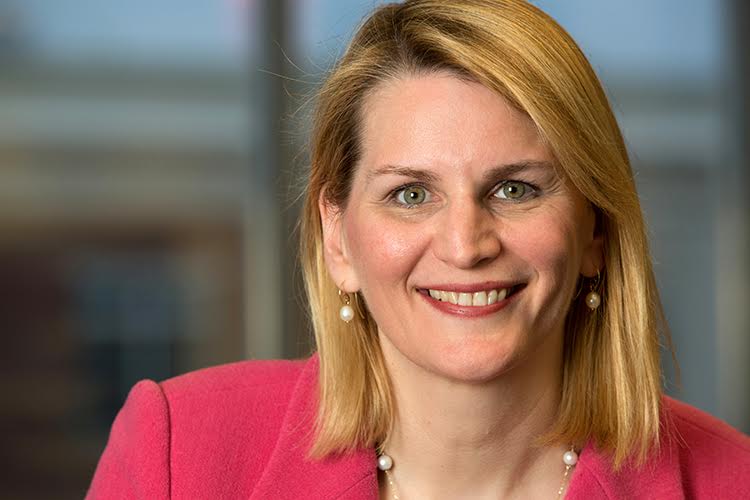
The Harbus Chief Operating Officer, Natasha Larsen, spoke with HBS PhD aluma, Katy George, about her path to McKinsey, experiences there, and advice to would-be consultants.
The Harbus: What was your path from HBS to your current position?

KG: I came to Harvard to do a Ph.D. in Business Economics and fell in love with the Technology and Operations Management coursework. I had worked in labor economics and done interesting research on workforce practices previously, and I realized I did not have to think about labor force issues from a purely economic point of view. Instead, I discovered how factories work and what it takes to make a workforce more productive and competitive. This is what ultimately led me to consider a career in consulting.
After Harvard, I joined McKinsey in the New York Office in 1996. I started out by developing my basic consulting skills like any new consultant. I had my first child in 1999 and when I came back from maternity leave, I decided to focus on healthcare because it gave me the ability to travel less. During this phase of my career, I learned the health care system in and out and I was part of a small group that built our healthcare operations practice. I had so much fun taking my long term passion in operations and marrying it with my interest in healthcare.
Today, as a senior partner in the New Jersey office, most of my work is in operations for pharmaceutical companies. I also lead our Manufacturing practice globally. In that role, I spend much time looking at global trends in manufacturing, including how to think about the right economic policies, human capital, development, etc. to ensure manufacturing in the US can carry a sustainable advantage. Much of my current career can be traced back to my time at Harvard and working with Prof. Jan Hammond.
TH: What defines a successful applicant or candidate at McKinsey?
KG: At McKinsey we look for people who have the drive to make things better. We also look for intellectual curiosity and passion. We look for people who are willing to get involved, get their hands dirty and figure things out; people who would see a gap and would want to design something new to better serve our clients, our colleagues and our firm.
Candidates need to have strong analytical and problem-solving skills (practice cases!) to be successful here. A big piece of how we deliver value to clients is through analytical rigor to solve the challenges they are facing. A successful McKinsey consultant also has great interpersonal skills. You have to be able to establish trust and rapport quickly. With a new client, you need to be able to demonstrate that you are acting in their best interest, that you are interested in what they do and think, and that you are there to make things better.
TH: What advice would you give to a student about pursuing a career in consulting?
 KG: I think HBS is a great place to prepare for a career in consulting. The case method, the discussions in class and the teamwork at HBS are all very well suited for a consulting career. If you know you want to go into consulting, it is a matter of getting to know the different firms, what they have to offer and where you would fit best as an individual. My advice is to talk to as many people as you can at the numerous recruiting events; ask yourself if these are the people you would want as colleagues; and ask them about the kinds of projects they do and what they are most excited about outside of work. That was important to me when I found my way to McKinsey – I found people I was comfortable with and I loved their passion for what they were doing. It was very exciting to feel that McKinsey was really plugged into areas where I wanted to get involved.
KG: I think HBS is a great place to prepare for a career in consulting. The case method, the discussions in class and the teamwork at HBS are all very well suited for a consulting career. If you know you want to go into consulting, it is a matter of getting to know the different firms, what they have to offer and where you would fit best as an individual. My advice is to talk to as many people as you can at the numerous recruiting events; ask yourself if these are the people you would want as colleagues; and ask them about the kinds of projects they do and what they are most excited about outside of work. That was important to me when I found my way to McKinsey – I found people I was comfortable with and I loved their passion for what they were doing. It was very exciting to feel that McKinsey was really plugged into areas where I wanted to get involved.
TH: What makes your company stand out?
KG: What I noticed at my first training program was McKinsey’s culture. I was used to an environment where people were aggressive and I found the opposite at McKinsey: I found a culture where people immediately gave you respect, assumed you were smart and were willing to help you.
Every incentive at McKinsey is geared toward making teams and individuals successful. So there’s no reason to feel threatened by a colleague’s success because we all help each other. As one of my partner colleagues says, “McKinsey’s partnership is a big table – you just need to bring your own chair.” Everyone has the opportunity to create new things and make the firm a better place. It is so much fun to be part of a great institution that is constantly evolving. I am amazed when I see all the new practices, new ways of serving our clients and new ways to create impact that we’ve developed over the past five years!
Our large scale and depth allow us to stand out, with more than 100 offices and experts in (almost) every field possible.
TH: Is there anything you would like to share with us?
KG: The last thing I would like to share is how proud I am of McKinsey’s legacy around women. We have had innovative approaches to part time and flexible programs for our colleagues – both women and men – ever since I’ve been here. Well over 1,500 consultants have taken advantage of those options. We are dedicated to developing female leaders and are proud that about a quarter of our North American offices today are led by women. Our women directors around the world form a very tight-knit group and we are passionate about mentoring and sponsoring women colleagues.
We have also conducted innovative research demonstrating the benefits of women in leadership positions; namely that women help improve overall organizational effectiveness and success. With this research, we help our clients and other organizations think about their own leadership diversity strategies.


